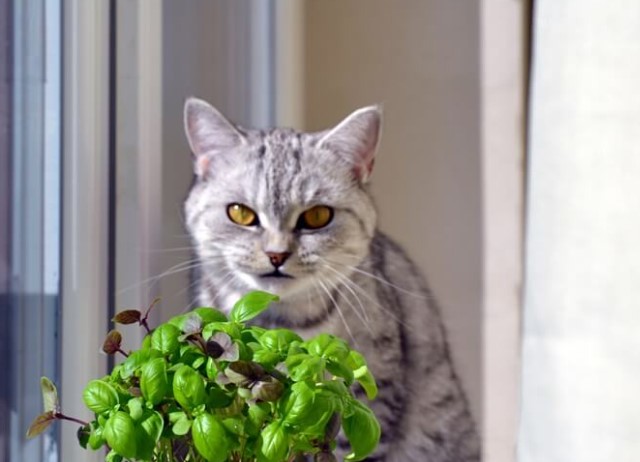Can cats eat basil? Is basil good for cats?
Can cats eat basil? In this article, we’ll dive deep into the health effects of basil for cats, whether it’s safe, potential benefits and risks, and how to introduce it to your pet’s diet if needed. Follow Cat Memorial Stones !!
Can cats eat basil? Is Basil Safe for Cats?
The good news is that basil is not toxic to cats. According to the ASPCA, basil is non-toxic to both cats and dogs, meaning it won’t harm your cat if they ingest it in small quantities. This applies to both fresh basil and dried basil. However, just because it’s safe doesn’t mean it’s necessary or always beneficial for your feline friend.

Is basil good for cats? Potential Benefits of Basil for Cats
Though cats are obligate carnivores, meaning their diet primarily requires meat, small amounts of certain herbs like basil can have some minor benefits:
- Anti-inflammatory Properties: Basil contains essential oils that have anti-inflammatory properties. For humans, these can reduce inflammation and may, in theory, help soothe minor inflammations in cats as well.
- Antioxidant Content: Basil is rich in antioxidants, which can combat free radicals and support overall health. For cats, though the need for antioxidants is lower, a small nibble might provide a mild boost to their immune system.
- Calming Effects: Some cat owners believe that basil has mild calming effects when ingested, much like how certain herbs like catnip work. However, these effects are not widely proven or researched in felines.
Risks of Feeding Basil to Cats
While basil is generally safe, there are a few risks associated with feeding it to your cat:
- Digestive Issues: Cats have sensitive digestive systems. Although basil isn’t toxic, consuming large amounts could lead to stomach upset, vomiting, or diarrhea. Their bodies are not designed to process large amounts of plant matter.
- Allergic Reactions: Just like humans, cats can have allergies. If your cat is exposed to basil for the first time and shows signs of an allergic reaction—such as itching, swelling, or difficulty breathing—discontinue feeding it immediately and consult a veterinarian.
- Essential Oils: Basil contains essential oils, which, in large quantities, could be harmful to cats. While basil in its fresh or dried form contains very little oil, it’s still important to monitor your cat’s intake.
>>> Click Can cats eat honey?
How to Safely Introduce Basil to Your Cat’s Diet

If you’re interested in letting your cat try basil, here are a few guidelines:
- Start Small: Begin with a tiny amount—perhaps a single leaf or a pinch of dried basil—and observe your cat for any adverse reactions.
- Wash Thoroughly: If using fresh basil, ensure it’s washed thoroughly to remove pesticides or other harmful chemicals.
- Monitor Closely: Keep an eye on your cat after introducing basil to ensure they don’t experience any digestive upset or allergic reactions.
- Limit Consumption: Basil should only be an occasional treat. Cats derive their nutritional needs from meat, so plant matter like basil should not become a regular part of their diet.
Is Thai basil toxic to cats?
Thai basil, like other varieties of basil, is generally considered safe for cats in small quantities. However, it’s crucial to remember that cats are obligate carnivores, and a balanced diet formulated for their specific needs is paramount. While not toxic, excessive consumption could lead to digestive upset or, in rare cases, allergic reactions. It’s always best to consult a veterinarian before introducing any new food to your cat’s diet, especially if they have pre-existing health conditions.
Can Cats Eat Other Herbs?
Many herbs that we commonly use in cooking are safe for cats, while others are toxic. Here’s a quick guide to herbs that are safe or dangerous for your feline companion:
- Safe Herbs for Cats:
- Parsley (in moderation)
- Cilantro
- Rosemary
- Catnip (highly enjoyed by many cats)
- Herbs Toxic to Cats:
- Garlic
- Onions
- Chives
- Oregano
Always research any herb before allowing your cat to ingest it, and when in doubt, consult with your vet.
Conclusion
So, can cats eat basil? Yes, but it should only be given in small amounts and as an occasional treat. Basil is safe and non-toxic for cats, but it doesn’t provide significant nutritional benefits for them, and overconsumption can lead to digestive issues. Always observe your cat after introducing any new food or herb, and prioritize their natural, meat-based diet for optimal health.
By being informed and cautious, you can safely allow your curious feline to explore the world of basil without worry.
>>> Read More: Can cats eat bananas?
